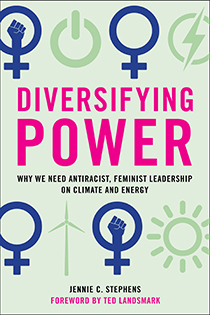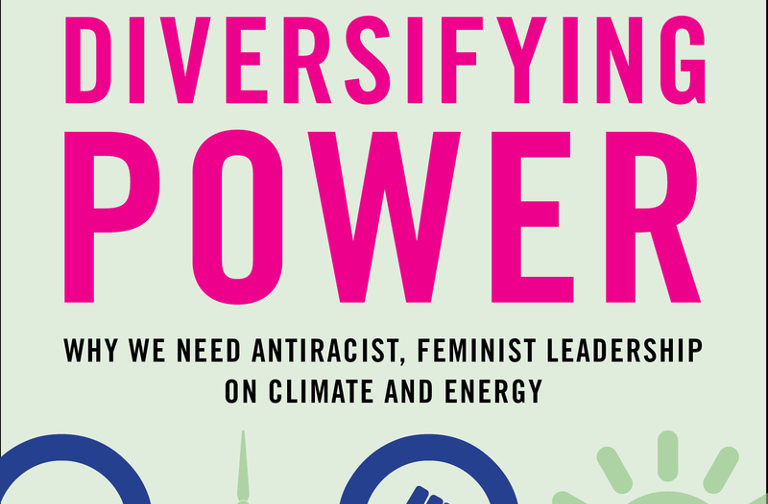 From Diversifying Power by Jennie C. Stephens. Copyright © 2020 by the author. Reproduced by permission of Island Press, Washington, DC.
From Diversifying Power by Jennie C. Stephens. Copyright © 2020 by the author. Reproduced by permission of Island Press, Washington, DC.
Diversifying Power
Jennie C. Stephens
Published by Island Press
https://islandpress.org/books/diversifying-power
Resisting the Polluter Elite
It could be argued that the most effective leaders influencing climate and energy policy so far have been a select group of decision makers that researcher Dario Kenner calls the polluter elite. The polluter elite are extremely rich individuals whose net worth, luxury lifestyle, and political influence rely on their accumulating wealth from their investments in polluting activities, most notably fossil fuels. Charles Koch, ExxonMobil executives and other wealthy shareholders, high-net-worth individuals, and executives at large multinational oil, gas, and coal companies who profit from continued fossil fuel reliance make up the polluter elite. In his 2019 book, Carbon Inequality: The Role of the Richest in Climate Change, Kenner explains that these leaders are particularly passionate about influencing climate and energy policy because their money, power, and influence depend on continued fossil fuel reliance. Since the 1980s, when climate change first became a public concern, these leaders have been strategically and secretively trying to block efforts to transition away from fossil fuels. By aligning with conservative, antigovernment, patriarchal, and racist politics, the polluter elite in the United States have used their political power to promote fossil fuel dependence, weaken public oversight of the fossil fuel industry, and limit consumer choice of fossil fuel alternatives. Unfortunately for the rest of the world, their efforts to support climate denial, resist renewable energy, and weaken public protections have been very effective, and their influence continues to expand. The disastrous US government response to COVID-19 results from decades of destructive influence of the polluter elite on US politics and public policy.
As the climate crisis worsens, economic inequities expand, and racial disparities grow, the dangerous tactics of the polluter elite are being revealed and their leadership is now being challenged. Leaders who prioritize economic and racial justice rather than corporate profits are mobilizing to resist the polluter elite, restore faith in the government’s role to protect the public, and restructure the institutions that have allowed the polluter elites to become so powerful. Among the national leaders resisting the power of the polluter elite by revealing their strategies and holding them accountable are Elizabeth Warren, Alexandria Ocasio-Cortez, and Bernie Sanders, and many more are active at the state and community levels.
As the movement grows, diverse leadership is essential. To effectively resist the influential billionaires who profit from the strategic dismissal of risks associated with growing inequity and climate disruptions, we need leaders who are committed to prioritizing the needs of disadvantaged and frontline communities.
Taking On ExxonMobil
Among the many inspiring examples of leaders taking on the polluter elite is Maura Healey of Massachusetts, the first openly gay attorney general in the United States. In October 2019, in Commonwealth v. Exxon Mobil Corporation, the Massachusetts attorney general’s office sued ExxonMobil for deceiving Massachusetts consumers about the role of its fossil fuel products in climate change and for misleading investors about the financial risks of climate change. Although several other states— including New York and Rhode Island— and a handful of cities— including New York City, Boulder, Oakland, and Baltimore— have filed similar lawsuits with the charge of misleading investors, Massachusetts filed the first lawsuit that uses consumer protection law to allege that false advertising deceived consumers. ExxonMobil ran advertisements in Massachusetts that suggested that its “synergy” gas and diesel products and its “green” Mobil 1 oil products reduce greenhouse gas emissions. Massachusetts alleges that this advertising was a deceptive “greenwashing” marketing campaign designed to intentionally mislead consumers. Healey, who has a track record of effectively leveraging her public office to fight for social justice, led this action. Throughout her career, she has demonstrated bold and principled antiracist, feminist leadership in multiple areas, including marriage equality, immigration rights, and resisting the polluter elite.
Healey, who was elected attorney general in 2014, calls herself the “people’s lawyer.” By doing so, she is elevating the value of the publicly supported state attorney general’s office. She reminds people all the time that her role is to protect people from injustices of all kinds, especially injustices perpetrated by corporations. As a civil rights lawyer, she has spent her career championing the safety and well-being of the most vulnerable individuals and communities. As attorney general, she works collaboratively with her team, and they pride themselves in being accessible and responsive to everyone. Suing ExxonMobil has been among her most ambitious and courageous acts. ExxonMobil executives have tried disparaging her and her team, and they have sued her back— but to no avail. Although Healey’s office originally filed the lawsuit in Massachusetts state court, ExxonMobil got the case moved to federal court, arguing that beyond state consumer protection law, the case relies on complex federal law.
In addition to her work within the state of Massachusetts, Healey has filed dozens of lawsuits challenging Trump administration policies, particularly around restricting immigration and attempts to bar transgender people from serving in the military. In this capacity, she has helped lead other Democratic, blue-state attorneys general to resist the Trump administration’s conservative and exploitative agenda. One reason Healey is so inspiring is that she demonstrates why government is crucial in upholding justice, whether it be economic justice, racial justice, or environmental justice.
Elected officials like Healey provide a shining light at a time when public trust in government in the United States is at an all-time low. According to a 2019 Pew Research Center report, only 17 percent of Americans say that they trust the federal government to do the right thing always or most of the time. With the uncoordinated and inconsistent national response to COVID-19, public trust in the federal government’s actions continued to decline in 2020. For decades, the declining public trust in government has been actively encouraged and supported by corporate leaders, including the Koch brothers, who know that strategic efforts to diminish the legitimacy of government can result in higher corporate profits. The blatant ways that the Trump administration has used governmental powers to further prioritize corporate profits over public protection has diminished trust even more. Among black Americans, the Trump administration has reinforced a deep mistrust of government and a skepticism of politicians that is based on a long legacy of direct experience of living in a society in which government has sponsored racial injustices. The racial disparities of COVID-19 have further exacerbated and reinforced widespread mistrust in government.
A trusted and competent government is an essential component of the transformative changes required to simultaneously confront the climate crisis and reduce economic and racial injustices. More representative and inclusive leaders like Healey are needed so that people and communities can see that their elected officials are representing their interests.





